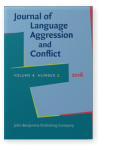“When did you decide to tell the truth?”
Negotiating truth in rape trials before the International Criminal Tribunal for the former Yugoslavia
Whilst there has been much investigation of courtroom testimony and other linguistic aspects of legal process, there has been little consideration of the linguistic basis of war crimes tribunals such as the International Criminal Tribunal for the former Yugoslavia (ICTY), which provides the data for this article. The testimony of witnesses in ICTY rape trials is investigated to discover how their examination by counsel may affect these alleged victims of a brutal war. The approach taken is textual as well as discoursal, focusing on the co-construction of meaning between counsel and witnesses — and its failures. The frequent meta discussions about the nature of truth in the testimony shows up some disjunction between the parties in their understanding of the process they are engaged in, leading to the conclusion that the witnesses may have been ‘revictimised’
References
Archer, Dawn
2011 “
Facework and Im/politeness across Legal Contexts: An Introduction.”
Journal of Politeness Research 71: 1–19.


Bassham, Gregory
2004 Critical Thinking. New York: McGraw-Hill.

Cotterill, Janet
2003 Language and Power in Court: A Linguistic Analysis of the O.J. Simpson Trial. Basingstoke: Palgrave Macmillan.


Cotterill, Janet
2010 “
Interpersonal Issues in Court: Rebellion, Resistance and Other Ways of Behaving Badly.” In
Interpersonal Pragmatics, ed. by
Miriam A. Locher and
Sage L. Graham, 353–380. Berlin/New York: Mouton de Gruyter.

Dembour, Marie-Bénédicte, and Emily Haslam
2004 “
Silencing Hearings? Victim-Witnesses at War Crimes Trials.”
European Journal of International Law 15 (1): 151–177.


Drew, Paul, and John Heritage
(eds) 1992 Talk at Work: Interaction in Institutional Settings. Cambridge: Cambridge University Press.

Eades, Diana
2008 Courtroom Talk and Neocolonial Control. Berlin, DEU: Mouton de Gruyter.


Ehrlich, Susan
2001 Representing Rape: Language and Sexual Consent. London: Routledge.


Goffman, Erving
1981 Forms of Talk. Pennsylvania: University of Pennsylvania Press.

Goodwin, Charles
1994 “
Professional Vision.”
American Anthropologist 96 (3): 606–633.


Grice, H. Paul
1975 “
Logic and Conversation.” In
Syntax and Semantics 3: Speech Acts, ed. by
Peter Cole and
Jerry Morgan, 41–58. New York: Academic Press.

Haack, Susan
2008 “
The Whole Truth and Nothing but the Truth.”
Midwest Studies in Philosophy 321: 20–35.
[URL],
[URL],
[URL]. DOI:


ICTY
IT-96-23 &23/1 Case Information Sheet. Accessed July 12, 2013.
[URL]
ICTY
IT-96-23 &23/1 Transcripts. Accessed July 12, 2013.
ICTY
IT-96-23 &23/1 Trial Chamber Judgement 22/02/2001. Accessed July 12, 2013.
[URL]
ICTY
Key Figures. Updated 08/07/2013. Accessed July 12, 2013.
Jeffries, Lesley
2003 “
Not a Drop to Drink: Emerging Meanings in Local Newspaper Reporting of the 1995 Water Crisis in Yorkshire.”
Text 23 (4): 513–538.


Jeffries, Lesley
2010 Critical Stylistics: The Power of English. Basingstoke: Palgrave Macmillan.


Jeffries, Lesley
2014a “
Interpretation.” In
The Cambridge Handbook of Stylistics, ed. by
Peter Stockwell and
Sarah Whiteley, 469–486. Cambridge: C.U.P..


Jeffries, Lesley
2014b “
Critical Stylistics.” In
The Routledge Handbook of Stylistics, ed. by
Michael Burke, 408–420. London: Routledge.

Jeffries, Lesley, and Matthew Evans
2015 “
The Rise of Choice as an Absolute ‘Good’: A Study of British Manifestos, 1900–2010.”
Language and Politics 14 (6): 751–777.

Jeffries, Lesley, and Brian Walker
Johnson, Alison, and Ruth Clifford
2011 “
Polite Incivility in Defensive Attack: Strategic Politeness and Impoliteness in Cross-examination in the David Irving vs. Penguin Books Ltd and Deborah Lipstadt Trial.”
Journal of Politeness Research 7 (1): 43–71.


Komter, Martha
2012 “
The Career of a Suspect’s Statement: Talk, Text, Context.”
Discourse Studies 14 (6): 731–752.


Mani, Rama
2002 Beyond Retribution: Seeking Justice in the Shadows of War. Cambridge: Polity Press.

Matoesian, Greg
1993 Reproducing Rape: Domination through Talk in the Courtroom. Chicago: University of Chicago Press.

Matoesian, Greg
2005 “
Nailing Down an Answer: Participations of Power in Trial Talk.”
Discourse Studies 7 (6): 733–759.


McCaul, Kim
2011 “
Understanding Courtroom Communication through Cultural Scripts.” In
Exploring Courtroom Discourse: The Language of Power and Control, ed. by
Anne Wagner and
Le Cheng, 11–28. Farnham: Ashgate.

Medica Mondiale
2009 “
...And that it does not Happen to Anyone Anywhere in the World”.
The Trouble with Rape Trials: Views of Witnesses, Prosecutors and Judges on Prosecuting Sexualised Violence during the War in the former Yugoslavia.
[URL]
Méndez, Juan E
1997 “
Accountability for Past Abuses.”
Human Rights Quarterly 19 (2): 255–282.


Minow, Martha
1998 Between Vengeance and Forgiveness: Facing History after Genocide and Mass Violence. Boston: Beacon Press.

Perrin, L.Timothy, H. Mitchell Caldwell, and Carol Chase
2003 The Art and Science of Trial Advocacy. Cincinnati, OH: Anderson.

Silverstein, Michael
2010 “
Nōlō Contendere: American Legal Advocacy and the Verbal Agōn.”
Humanities Day, University of Chicago.

Simpson, Paul
1993 Language, Ideology and Point of View. London: Routledge.


Stover, Eric
2005 The Witnesses: War Crimes and the Promise of Justice in the Hague. Philadelphia: University of Pennsylvania Press.


Teitel, Ruti G
2000 Transitional Justice. Oxford: Oxford University Press.

Theissen, Gunnar
2004 Supporting Justice, Co-existence and Reconciliation after Armed Conflict: Strategies for Dealing with the Past. Berlin: Berghof Forschungszentrum für konstruktive Konfliktbearbeitung. Accessed July 12, 2013.


Weinstein, Harvey M., and Eric Stover
2004 “
Introduction: Conflict, Justice and Reclamation.” In
My Neighbor, My Enemy. Justice and Community in the Aftermath of Mass Atrocity, ed. by
Eric Stover and
Harvey M. Weinstein, 1–26. Cambridge: Cambridge University Press.


Cited by
Cited by 1 other publications
Douthwaite, John, Daniela Francesca Virdis & Elisabetta Zurru
This list is based on CrossRef data as of 3 june 2024. Please note that it may not be complete. Sources presented here have been supplied by the respective publishers.
Any errors therein should be reported to them.
